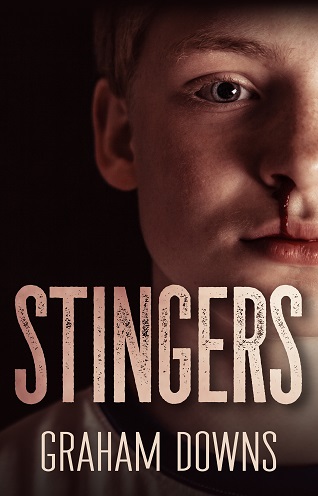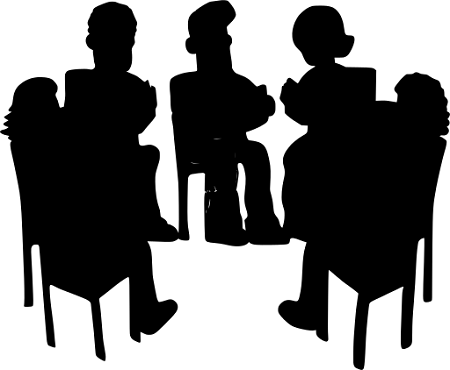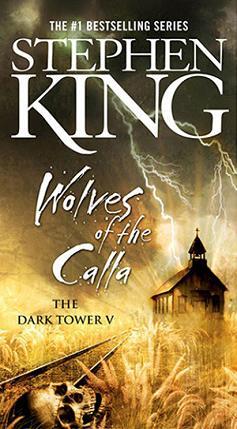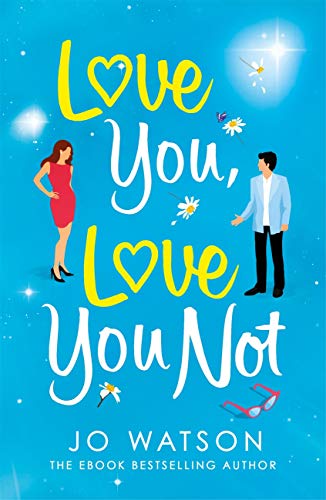If you haven't seen this yet I can now share that the new cover for my High School bullying story, Stingers, is done. Isn't it gorgeous?
How this came about was that I entered it last year, into the BookLife Cover Redesign contest, and I won the December 2019. So it's going to be featured in the next issue of BookLife magazine, along with an article explaining all the ways the new cover is better than the old one.
By the time you read this, the new cover should be live for the ebook on all stores (click the image to find out where you can buy it), but the print version will take a bit longer, because I plan to use this opportunity to release a brand new edition of it, with all the typos and other issues fixed that I've been correcting in the ebook over the years.
I honestly can't tell you how happy I am with this cover. I think Michelle Argyle from Melissa Williams Design did a fantastic job, and the moment I saw it, I just knew, that boy is James. To a tee.
Have you read the book? If so, would you agree? Is that how you pictured James? Could it be how you picture James?
Tuesday, 31 December 2019
Tuesday, 24 December 2019
2019 Blog Stats
You know what I haven't done in a while? Taken a look through my Google Analytics and extracted useful information from all my blog visitors, for a whole year.
There's actually a wealth of information to be found from Google's visitor tracking service, so I thought I'd pull a report from 24 December 2019 to date, to see what we could see. Hope you find it as interesting as I did!

So let's begin: during the period, 1077 unique users visited my page, viewing 3327 pages across 1377 sessions. That means that each unique user visited my blog approximately 1.28 separate times. The average session duration was just 42 seconds, though, so people didn't spend a lot of time actually reading my content.
Top Countries
The top five countries where traffic originated this year were:
Operating Systems
Now this is really surprising, because we're constantly being told that most users surf the web exclusively (or almost exclusively) from their mobile devices these days.
In my case, although the top spot here goes to Android, it's clear that the vast majority of visitors actually come from PCs:
Where Do They Come From?
Social is king, as they've been saying for years, and the bulk of my social referrals come from Twitter and Facebook. But I get a decent amount of traffic from search—which is heartening, because it means people are searching for and finding my evergreen content:
The volume of traffic I get from Email is also good news, because it means that people are opening and reading my email newsletters, and clicking through to my blog from those.
Top Posts
Finally, my five most visited posts of the year. I love how three of those five are for posts that talk about places to get ebooks other than Amazon. As you know, a massive part of my outreach is getting people to understand that Amazon is not the be-all and end-all when it comes to ebooks, and that many of their business practices are actually damaging our beloved industry by stifling competing outlets.
Also nice to see those two articles from 2018 still getting love... although I hope more of you visit the 2019 edition of your favourite book of all time, and vote on that!
Well, that's it, dear readers. I don't have any words of wisdom, or deep philosophical questions to ask at the end of this post. This has been purely an exercise in mental masturbation. I enjoyed and found it interesting, and I hope you did too. If not.... ;-)
There's actually a wealth of information to be found from Google's visitor tracking service, so I thought I'd pull a report from 24 December 2019 to date, to see what we could see. Hope you find it as interesting as I did!

So let's begin: during the period, 1077 unique users visited my page, viewing 3327 pages across 1377 sessions. That means that each unique user visited my blog approximately 1.28 separate times. The average session duration was just 42 seconds, though, so people didn't spend a lot of time actually reading my content.
Top Countries
The top five countries where traffic originated this year were:
- United States
- South Africa
- United Kingdom
- India
- Canada
Operating Systems
Now this is really surprising, because we're constantly being told that most users surf the web exclusively (or almost exclusively) from their mobile devices these days.
In my case, although the top spot here goes to Android, it's clear that the vast majority of visitors actually come from PCs:
- Android [Mobile]
- Windows
- iOS [Mobile]
- Macintosh
- Linux
Where Do They Come From?
Social is king, as they've been saying for years, and the bulk of my social referrals come from Twitter and Facebook. But I get a decent amount of traffic from search—which is heartening, because it means people are searching for and finding my evergreen content:
- Social
- Organic Search
- Direct
- Referral
The volume of traffic I get from Email is also good news, because it means that people are opening and reading my email newsletters, and clicking through to my blog from those.
Top Posts
Finally, my five most visited posts of the year. I love how three of those five are for posts that talk about places to get ebooks other than Amazon. As you know, a massive part of my outreach is getting people to understand that Amazon is not the be-all and end-all when it comes to ebooks, and that many of their business practices are actually damaging our beloved industry by stifling competing outlets.
- Why I Will No Longer Buy Books From Amazon, If They're in KDP Select / Kindle Unlimited (May 2019)
- Overdrive Libraries in South Africa (August 2018)
- What's your favourite book of all time? (December 2018)
- Writing for an American Audience: Why do Authors Compromise? (July 2019)
- Alternatives to Kindle Unlimited (February 2019)
Also nice to see those two articles from 2018 still getting love... although I hope more of you visit the 2019 edition of your favourite book of all time, and vote on that!
Well, that's it, dear readers. I don't have any words of wisdom, or deep philosophical questions to ask at the end of this post. This has been purely an exercise in mental masturbation. I enjoyed and found it interesting, and I hope you did too. If not.... ;-)
Tuesday, 17 December 2019
What to do with Graham's Super-secret Readers' Circle?
A few years ago, all the authors I knew were talking about Facebook Groups. At the time, someone suggested creating a secret Facebook group and making membership in it a perk of signing up to an author's email list.
That's exactly what I did, and Graham's Super-secret Readers' Group was born.
That's exactly what I did, and Graham's Super-secret Readers' Group was born.
The idea was that if you signed up to my mailing list, you got an email with the link to that group, and when you applied to join the group, you had to confirm your email address to prove you belonged to my list.
All well and good, but the thing is, I never really knew what to do with it. Over the years, people have joined and left, and others have joined and left, and at the time of this writing, we have the grand total of 10 (count 'em) members!
In 2020, I want to really start showing the group some love! Some of the things I'm thinking of include:
- Fun games to play
- A monthly competition where you can win gift cards/vouchers to your favourite ebookstores
- The opportunity to hear about cool stuff, even before the rest of my email list
- Really exclusive cool stuff that the rest of my email list never hears about
- Anything else I can think of... or anything you can
What do you think, dear reader? Are you in?
To get your invitation to Graham's Super-secret Readers' Circle, click the image below to sign up for my mailing list.
Happy reading!
Tuesday, 10 December 2019
My favourite book of 2019
It's that time again: time to tell you my favourite book of 2019. Not necessarily published in 2019, you understand. Just my favourite out of all the books I read in 2019.
But first, a bit of background, for those who don't know me. It's important to understand that I review every single book I read, on social reading site Goodreads. In fact, my philosophy is "No review means it never happened."
I also tend to be very susceptible to small things like typos and grammatical errors, or plot holes, or even formatting faux pas. For this reason, no matter how good a book is, if I find just one of those types of things in it, the possibility of a five-star review is immediately and irrevocably off the table.
This year, I read a lot of books (45 so far, but I might just get another one or two under my belt before year's end), and this year, I really struggled to find even one that met my high standards.
I did find one, though. This year, I managed to get through Stephen King's The Dark Tower series from start to finish. It wasn't what I would call a stupendously good series or anything, but I'm glad I finally read it. There was one volume, though, which got my coveted five-star rating, and in fact, it was the only book to do so out of all the books I read this year. That book was Wolves of the Calla:
But first, a bit of background, for those who don't know me. It's important to understand that I review every single book I read, on social reading site Goodreads. In fact, my philosophy is "No review means it never happened."
I also tend to be very susceptible to small things like typos and grammatical errors, or plot holes, or even formatting faux pas. For this reason, no matter how good a book is, if I find just one of those types of things in it, the possibility of a five-star review is immediately and irrevocably off the table.
This year, I read a lot of books (45 so far, but I might just get another one or two under my belt before year's end), and this year, I really struggled to find even one that met my high standards.
I did find one, though. This year, I managed to get through Stephen King's The Dark Tower series from start to finish. It wasn't what I would call a stupendously good series or anything, but I'm glad I finally read it. There was one volume, though, which got my coveted five-star rating, and in fact, it was the only book to do so out of all the books I read this year. That book was Wolves of the Calla:
Wolves of the Calla
(The Dark Tower #5)
by Stephen King
About the Book
Roland and his tet have just returned to the path of the Beam when they discover that they are being followed by a group of inexperienced trackers. The trackers are from the town of Calla Bryn Sturgis, and they desperately need the help of gunslingers. Once every generation, a band of masked riders known as the Wolves gallop out of the dark land of Thunderclap to steal one half of all the twins born in the Callas. When the children are returned, they are roont, or mentally and physically ruined. In less than a month, the Wolves will raid again. In exchange for Roland’s aid, Father Callahan—a priest originally from our world—offers to give Roland a powerful but evil seeing sphere, a sinister globe called Black Thirteen which he has hidden below the floorboards of his church. Not only must Roland and his tet discover a way to defeat the invincible Wolves, but they must also return to New York so that they can save our world’s incarnation of the Dark Tower from the machinations of the evil Sombra Corporation.
My Review
Best one yet!
While on their continuing quest for The Dark Tower, Roland and his ka-tet are waylaid by a village in crisis. The gunslingers - because they are all gunslingers in their own right, by now - have to decide whether they can help. And if they can help, they must, and are not allowed to accept any kind of payment, according to the Gunslinger Code.
This book mostly concerns that side quest, but there's a helluva lot of depth, and along the way, they discover much that will aid them in their main quest.
In my review of the last book (Wizard and Glass) in this series, I lamented the long, drawn-out, and somewhat inappropriate backstory. Well, this one ALSO has a significant chunk of backstory to share, but it's nothing like the one in Wizard and Glass. This one's entirely appropriate and perfectly paced, and we're constantly reminded that it is, in fact, a backstory.
In many ways, it forms somewhat of a sequel to 'Salem's Lot. I'll say no more than that, but if you haven't read that book, I strongly suggest you do so before reading Wolves of the Calla.
Back to the main story of this book: the village and its inhabitants are so richly detailed, none of them are "cardboard cutouts" by any means, and their own unique dialect is presented so beautifully, so consistently... I can only call it a literary masterpiece.
Around about 85% of the way through, I started noticing the odd typo here and here. These were clearly things that the editors missed (but in a book this long, who can blame them?). If you know me, you'd know that normally a single typo would be enough to destroy any book's chances of getting a five-star review from me. But in this case, I was so engrossed by the time I spotted the first one, and there are so comparatively few of them, that it didn't matter.
As the author himself advises in his introduction, I wouldn't recommend reading this book if you haven't read the first four (skip the "point fives", though - just read the main story), but if you've been struggling through, I promise you you won't regret sticking with it for this one!
Click here (or the cover above) to find out where you can get a copy of the ebook: https://books2read.com/u/mYKK0o
Note: that's an affiliate link, so if you click it, and then click through to one of the stores and end up buying something, I might earn a small commission from your purchase.
Tuesday, 3 December 2019
Your Favourite Book of All Time (Open Call)
It's that time again. Last year around about this time, I asked you all what your favourite book of all time was, and the winner was one I'd never heard of before: That Hideous Strength by C.S. Lewis.
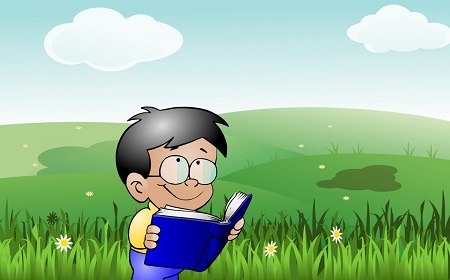
It went so well, that I thought we'd do it all over again.
So here we go: I'd like you all to fill out the form below, and tell me what you would say your favourite book of all time is.
I'm looking for individual books only. Don't vote for a whole series, please - you must decide which individual book in that series is your favourite, and enter that instead.
I'll keep this open call running for a month, until 6 Jan 2020. Then I'll crunch the numbers, and announce the shortlist, here on this blog the next day.
If you'd like to be one of the first people to know when the shortlist is out, be sure you enter your email address into the form, after your vote. That's completely optional, of course, and if you do enter it, I promise to only use it to send you the shortlist and final results when they're out. After which, I will delete your address from my database.
Does that all make sense? Sound good? Very well, then. Go! :-)
Please play along and nominate. What's nice about these nominations, in my opinion, is that unlike all the others that do the rounds this time of year, this one's not restricted to publication date, publication method (self-published or traditionally published) or format. If a book was published, at any time in history, by any means and in any format, you can vote for it!

It went so well, that I thought we'd do it all over again.
So here we go: I'd like you all to fill out the form below, and tell me what you would say your favourite book of all time is.
I'm looking for individual books only. Don't vote for a whole series, please - you must decide which individual book in that series is your favourite, and enter that instead.
I'll keep this open call running for a month, until 6 Jan 2020. Then I'll crunch the numbers, and announce the shortlist, here on this blog the next day.
If you'd like to be one of the first people to know when the shortlist is out, be sure you enter your email address into the form, after your vote. That's completely optional, of course, and if you do enter it, I promise to only use it to send you the shortlist and final results when they're out. After which, I will delete your address from my database.
Does that all make sense? Sound good? Very well, then. Go! :-)
Please play along and nominate. What's nice about these nominations, in my opinion, is that unlike all the others that do the rounds this time of year, this one's not restricted to publication date, publication method (self-published or traditionally published) or format. If a book was published, at any time in history, by any means and in any format, you can vote for it!
Tuesday, 26 November 2019
Don't Promote Ebooks on Black Friday
As an author, it might not surprise you to learn that I read a lot of stuff online about marketing. Mostly book marketing, and in fact, mostly ebook marketing (since that’s a self-published author’s bread and butter).
I got an email the other day from a respected marketing company, asking authors if we ran Black Friday promotions for our ebooks. “Don’t,” said the email, “because nobody’s shopping online on Black Friday. They’re all out in brick and mortar stores.”
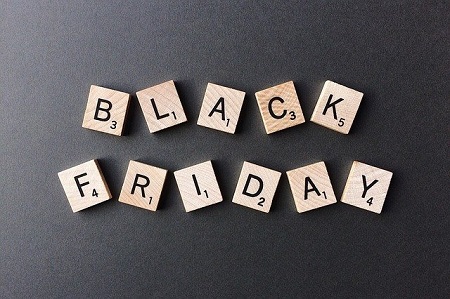
Now, I know Black Friday is a relatively recent development in South Africa (say, the last three or four years), but physical shopping in a physical store is just not something I’ve ever associated with the day. I did it once, when I went to Checkers with my dad and came out with a year’s supply of pool chemicals. But that was years ago now, and I’ve not done it again. Then, about two years ago we bought something at a physical store on Black Friday, but it wasn’t on Black Friday promotion, so it doesn’t count.
But my wife and I eagerly anticipate Black Friday weekend every year, knowing that we’re going to pick up some amazing deals. This year we’re looking for new cell phones. But we’re going to check all the online retailers; we have no intention of leaving the house to go shopping.
Of course, I’m probably a big outlier here, because in general, I do very little “brick and mortar” shopping anymore. Groceries and clothes, and that’s about it.
Is this still a thing? Do people still flock to physical stores on major shopping days like Black Friday?
Image by Wokandapix from Pixabay
I got an email the other day from a respected marketing company, asking authors if we ran Black Friday promotions for our ebooks. “Don’t,” said the email, “because nobody’s shopping online on Black Friday. They’re all out in brick and mortar stores.”

Now, I know Black Friday is a relatively recent development in South Africa (say, the last three or four years), but physical shopping in a physical store is just not something I’ve ever associated with the day. I did it once, when I went to Checkers with my dad and came out with a year’s supply of pool chemicals. But that was years ago now, and I’ve not done it again. Then, about two years ago we bought something at a physical store on Black Friday, but it wasn’t on Black Friday promotion, so it doesn’t count.
But my wife and I eagerly anticipate Black Friday weekend every year, knowing that we’re going to pick up some amazing deals. This year we’re looking for new cell phones. But we’re going to check all the online retailers; we have no intention of leaving the house to go shopping.
Of course, I’m probably a big outlier here, because in general, I do very little “brick and mortar” shopping anymore. Groceries and clothes, and that’s about it.
Is this still a thing? Do people still flock to physical stores on major shopping days like Black Friday?
Image by Wokandapix from Pixabay
Tuesday, 19 November 2019
Do you lick your fingers to turn the pages? On judginess and book shaming
This will be a ranty post. Also, let me preface it with the fact that the vast majority of the books I read are ebooks. I seldom, if ever, read books printed on paper anymore.
I saw a post the other day, from someone pointing out how ebooks are better than paper books. It went like this:
First, I'm going to answer the question as written, and explain why I personally don't think it's an issue. Then I'm going to talk a little about why I think questions like that are dangerous and unnecessary.
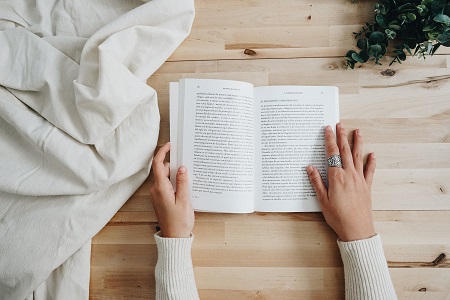
Do I lick my fingers before turning a page?
No, not as a rule. I've been known to do so if the pages stick, but I know there are people who do it as a habit. And it doesn't matter if it's their own book, a friend's book, a library book, or one they found in a secondhand bookstore.
But here’s the thing: people have been doing that for hundreds, if not thousands, of years. For as long as paper books have existed, in fact. Now I wish I could tell you that nobody’s ever died from reading a book because someone before them licked their fingers and turned a page, but I can’t because I don’t know. My gut tells me it’d be rare, though — rare enough for it not to matter.
And when I think of that question, I think about the (somewhat, but not quite related) habit of licking stamps. Sure, we rarely send letters these days, but if you ever did, I guarantee you licked the stamps before you stuck them on the envelope. So every letter you received contained someone else's saliva. And what if you collect stamps? Your stamp book contains hundreds or thousands of DNA samples from other people.
I’m reminded of those memes on social media, giving examples of all the things we used to do as kids which people frown upon now, and how we turned out all right, regardless.
In fact, I grew up believing that exposure to germs is necessary — crucially important — to the development of a healthy immune system. All the way through primary school, I was the kid who was always putting things in his mouth. I would chew on pencils and suck on erasers. I would literally tear pieces of paper out of my workbooks and chew them. Some might consider that a symptom of a mental disorder, but I grew out of it (or I just discovered cigarettes in high school, granting a social acceptability to my oral fixation), and I turned out okay.
Aside from that, we stuck our tongues on iced-over soccer goalposts. We pressed our lips on the hot Slasto and timed how long it took for our spit to evaporate. We skinned our knees and our fathers (sometimes our friends’ fathers) spat on them. We made and ate mud pies, many of which probably contained dog mess. We swam in slimy dams. The list goes on.
Even today, as adults, there are about a million ways we're exposed to germs every day. The man you just shook hands with? What if he went to the toilet five minutes ago and didn't wash his hands properly? Or maybe the other person he shook hands with five minutes before had just finished masturbating?
Or perhaps the lady sitting next to you in church or the cinema just coughed into her fist, shooting her germ-laden spittle a hundred and eighty degrees towards you.
And what if one of those people were to swipe their cellphone, tablet, or ereader screen and then hand it to you so you could look at something? That's a fairly common occurrence, and it might just be the electronic equivalent of licking the pages in a paper book before turning them.
I suppose technically, any of these things could kill you, but I do firmly believe that, unless you have a compromised immune system (through being very young, very old, or having an auto-immune condition, for example), being exposed to them in moderation can only strengthen you. Unless you’re in China, maybe, and you have to wear a surgical mask to leave the house!
Having said all this, I understand a little about phobias. I’m deathly afraid of spiders and marginally afraid of heights (although I love to fly, because once you’re no longer connected to the ground by anything, the height doesn’t matter anymore).
Germophobia, though? Nah, that's never been one of mine. I suppose there are lots of perfectly logical reasons to fear germs. More than spiders or heights, maybe. But they've never been something I've concerned myself with.
Note that I fully expect to be inundated with comments, from people who know people who have died from every one of those things I mentioned. Also, I wouldn't recommend swimming in slimy dams full of effluent, because the level of toxicity in our liquid waste is far higher today than when we were kids. But my point stands: exercise a little common sense and expose yourself to everyday bacteria in moderation, and you'll build a strong, healthy immune system... unless you have a condition that compromises your immune system, as I pointed out. Also, cue the obligatory disclaimers about me not being a medical professional, and me not offering medical advice!
Why is this such a problem?
Many people hold religious-level feelings about book formats and will defend to the death their distaste for one over another. This most often manifests as paper book die-hards attacking consumers of ebooks and audiobooks, sometimes going so far as to imply that ebooks aren't real books.
If we're not careful (and I've been guilty of this too), we ebook and audiobook fans could fall into the trap of "fighting back" and lashing out, and I don't think that's helpful.
The problem is, when asking a question/making a statement like the one that sparked this post, unless you’re careful about your wording and intonation, it can come across as “judgy” or “preachy”. Mocking of people who still prefer to read off paper.
That's tantamount to disparaging someone for enjoying Fifty Shades of Gray, or for liking pulp fantasy or Klingon-human romance or something. That's called Book Shaming. And it's not cool.
We need to hold ourselves to a higher standard. Personally, I always strive to keep my wording along the lines of why I prefer ebooks, or why I don't read paper books anymore, without trying to prescribe what other people should or shouldn't do, or poke fun at them for doing or not doing certain things.
As readers, let's stick together. The reading is the important bit, not the format on which we consume books. Let's go out into the world and show all our non-reading friends how important reading is, and how much fun it can be.
I saw a post the other day, from someone pointing out how ebooks are better than paper books. It went like this:
"Do you lick your finger before turning a page? If so how many germs are transferred, would you do this with a library book or a friend's book? Or just your own? Long live ebooks!"
First, I'm going to answer the question as written, and explain why I personally don't think it's an issue. Then I'm going to talk a little about why I think questions like that are dangerous and unnecessary.

Do I lick my fingers before turning a page?
No, not as a rule. I've been known to do so if the pages stick, but I know there are people who do it as a habit. And it doesn't matter if it's their own book, a friend's book, a library book, or one they found in a secondhand bookstore.
But here’s the thing: people have been doing that for hundreds, if not thousands, of years. For as long as paper books have existed, in fact. Now I wish I could tell you that nobody’s ever died from reading a book because someone before them licked their fingers and turned a page, but I can’t because I don’t know. My gut tells me it’d be rare, though — rare enough for it not to matter.
And when I think of that question, I think about the (somewhat, but not quite related) habit of licking stamps. Sure, we rarely send letters these days, but if you ever did, I guarantee you licked the stamps before you stuck them on the envelope. So every letter you received contained someone else's saliva. And what if you collect stamps? Your stamp book contains hundreds or thousands of DNA samples from other people.
I’m reminded of those memes on social media, giving examples of all the things we used to do as kids which people frown upon now, and how we turned out all right, regardless.
In fact, I grew up believing that exposure to germs is necessary — crucially important — to the development of a healthy immune system. All the way through primary school, I was the kid who was always putting things in his mouth. I would chew on pencils and suck on erasers. I would literally tear pieces of paper out of my workbooks and chew them. Some might consider that a symptom of a mental disorder, but I grew out of it (or I just discovered cigarettes in high school, granting a social acceptability to my oral fixation), and I turned out okay.
Aside from that, we stuck our tongues on iced-over soccer goalposts. We pressed our lips on the hot Slasto and timed how long it took for our spit to evaporate. We skinned our knees and our fathers (sometimes our friends’ fathers) spat on them. We made and ate mud pies, many of which probably contained dog mess. We swam in slimy dams. The list goes on.
Even today, as adults, there are about a million ways we're exposed to germs every day. The man you just shook hands with? What if he went to the toilet five minutes ago and didn't wash his hands properly? Or maybe the other person he shook hands with five minutes before had just finished masturbating?
Or perhaps the lady sitting next to you in church or the cinema just coughed into her fist, shooting her germ-laden spittle a hundred and eighty degrees towards you.
And what if one of those people were to swipe their cellphone, tablet, or ereader screen and then hand it to you so you could look at something? That's a fairly common occurrence, and it might just be the electronic equivalent of licking the pages in a paper book before turning them.
I suppose technically, any of these things could kill you, but I do firmly believe that, unless you have a compromised immune system (through being very young, very old, or having an auto-immune condition, for example), being exposed to them in moderation can only strengthen you. Unless you’re in China, maybe, and you have to wear a surgical mask to leave the house!
Having said all this, I understand a little about phobias. I’m deathly afraid of spiders and marginally afraid of heights (although I love to fly, because once you’re no longer connected to the ground by anything, the height doesn’t matter anymore).
Germophobia, though? Nah, that's never been one of mine. I suppose there are lots of perfectly logical reasons to fear germs. More than spiders or heights, maybe. But they've never been something I've concerned myself with.
Note that I fully expect to be inundated with comments, from people who know people who have died from every one of those things I mentioned. Also, I wouldn't recommend swimming in slimy dams full of effluent, because the level of toxicity in our liquid waste is far higher today than when we were kids. But my point stands: exercise a little common sense and expose yourself to everyday bacteria in moderation, and you'll build a strong, healthy immune system... unless you have a condition that compromises your immune system, as I pointed out. Also, cue the obligatory disclaimers about me not being a medical professional, and me not offering medical advice!
Why is this such a problem?
Many people hold religious-level feelings about book formats and will defend to the death their distaste for one over another. This most often manifests as paper book die-hards attacking consumers of ebooks and audiobooks, sometimes going so far as to imply that ebooks aren't real books.
If we're not careful (and I've been guilty of this too), we ebook and audiobook fans could fall into the trap of "fighting back" and lashing out, and I don't think that's helpful.
The problem is, when asking a question/making a statement like the one that sparked this post, unless you’re careful about your wording and intonation, it can come across as “judgy” or “preachy”. Mocking of people who still prefer to read off paper.
That's tantamount to disparaging someone for enjoying Fifty Shades of Gray, or for liking pulp fantasy or Klingon-human romance or something. That's called Book Shaming. And it's not cool.
We need to hold ourselves to a higher standard. Personally, I always strive to keep my wording along the lines of why I prefer ebooks, or why I don't read paper books anymore, without trying to prescribe what other people should or shouldn't do, or poke fun at them for doing or not doing certain things.
As readers, let's stick together. The reading is the important bit, not the format on which we consume books. Let's go out into the world and show all our non-reading friends how important reading is, and how much fun it can be.
Wednesday, 13 November 2019
I Was Interviewed on Caxton Radio
If you follow me on social media, or you subscribe to my email newsletter, you'll probably know that they interviewed me yesterday
It was for a local streaming-only station called Caxton Radio, based in Emperor's Palace, and it was my first... Well, there was an "almost interview" for a radio station in Cape Town a few years ago, but that fell through. Besides, that one would've studio 've
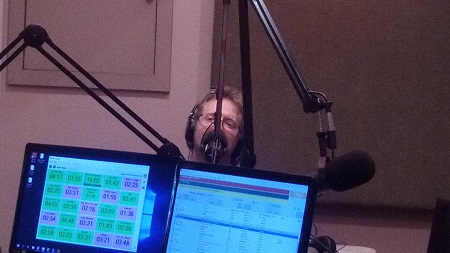
The DJ was Paul Rotherham, whom I've known for many years; we've when Montecasino to sit studio
This is the first time we've ever spoken on air, though, and I have to tell you, the man is just as much the consummate professional I've always known him to be.
He didn't brief me beforehand about the questions hewas going to that been interviewed On the other hand, I the fact radioland
We discussed my RetinitisPigmentosa , as I said,
I brought in a copy of one of my books, Heaven and Earth: Paranormal Flash Fiction, and we chatted about that a bit, and he even (scree!) read the back blurb of it on air. Now that was a surreal experience, let me tell you!
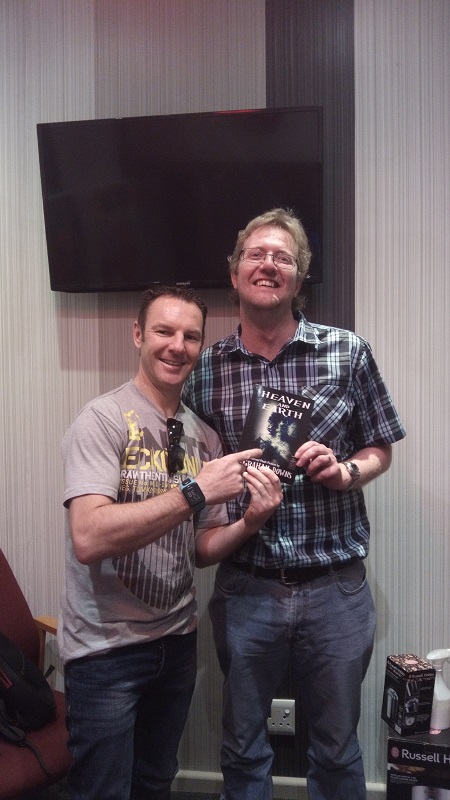
suffice it to say,
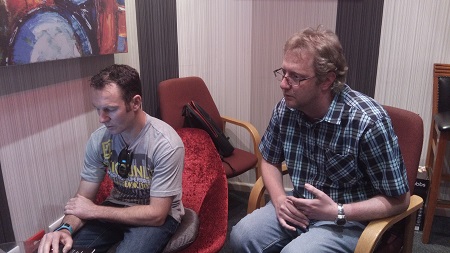
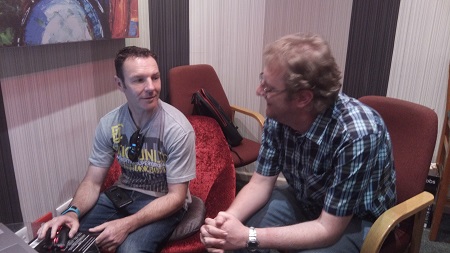
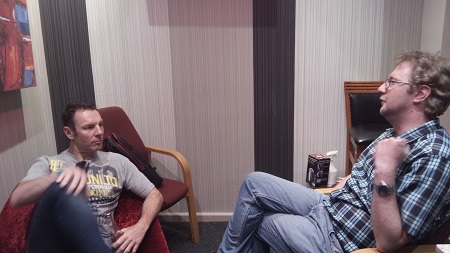
By the way, for ( and more pics), feel free to check out my Facebook album. Click here.
It was for a local streaming-only station called Caxton Radio, based in Emperor's Palace, and it was my first... Well, there was an "almost interview" for a radio station in Cape Town a few years ago, but that fell through. Besides, that one would

The DJ was Paul Rotherham, whom I've known for many years;
This is the first time we've ever spoken on air, though, and I have to tell you, the man is just as much the consummate professional I've always known him to be.
He didn't brief me beforehand about the questions he
We discussed my Retinitis
I brought in a copy of one of my books, Heaven and Earth: Paranormal Flash Fiction, and we chatted about that a bit, and he even (scree!) read the back blurb of it on air. Now that was a surreal experience, let me tell you!

I gave away a copy of that one on Twitter, with people having to listen in, and follow both me and Paul:
After the interview, the two of us had a quick meeting. I'm not prepared to divulge the details of said meeting yet, but[ZA only] Follow @PaulRotherhamZA and @GrahamDowns, then tune in to #CaxtonRadio (https://t.co/RYconkjW50) and RT this tweet within the next 24hrs for a chance to win a signed paperback of my #paranormal flash fiction collection, Heaven and Earth! Winners announced tomorrow.— Graham Downs 📚 🇿🇦 (@GrahamDowns) November 11, 2019pic twitter.com/ . AvdodHccIG



It was really be reminded janes happen to be doing what they love.
So thank you, Paul, for a wonderful interview and a productive discussion. Here's to many more!
Tuesday, 5 November 2019
Featured South African Indie Authors
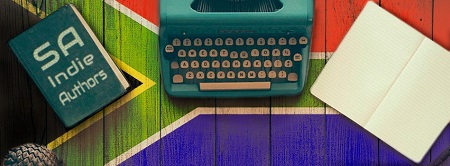
If you're a member of my monthly email newsletter, you'll know that each month, I select one South African independent (indie) author to feature. But it occurred to me that I didn't have anywhere to store a complete, exhaustive list of all the authors I've featured.
Until now.
I'll be updating this blog post every month, as I feature new authors, so check back
These people are all South African born, but I can't promise they are living in South Africa as you're reading this (they were at the time I featured them, however). Similarly, most were IndieWide authors at the time I featured them, but I can't promise they still are.
Want a Random Author?
If you're not sure what you're looking for, you can click below to go to my website, where I'll give you a totally random person from this list. Then you can visit them on Goodreads and check out their books.
[ Find Me a Random Author ]
Without further ado, here's the list, in alphabetical order by surname. Click on a name to visit the author's Goodreads page. Happy reading:
- Christine Bernard (Featured August 2018)
aka Grace Parks Linzé - Londa Cele (Featured January 2020)
- Sian B.
Claven - Susie Dinneen (Featured April 2019)
- Masha Du Toit (Featured November 2018)
- Richard James Edwards (Featured July 2020)
- Kelan
Gerriety Richard Gradner - N Gray (Featured July 2019)
- Stephen Hayes (Featured January 2019)
- Phakiso Hlatshwayo (Featured February 2020)
- Bill James (Featured November 2020)
- Monica Kagan (Featured June 2019)
- Raashida Khan (Featured September 2020)
Suneé - Pertunia Lehoka (Featured October 2019)
- J. Macgregor (Featured July 2018)
- aka Jo Macgregor
- aka
Joanne Macgregor - Jo Macgregor (Featured July 2018)
- aka J. Macgregor
- aka
Joanne Macgregor Joanne Macgregor - aka J. Macgregor
- aka Jo Macgregor
- K.A. Mann (Featured December 2019)
- Paula Marais (Featured March 2019)
- Jay Matthew (Featured July 2020)
- Rachel Morgan (Featured August 2020)
- Thabile Gloria Mtshali (Featured March 2020)
Grace Parks - Lebitso Ramphore (Featured May 2020)
- Michelle Sciacca (Featured September 2018)
- Romy Sommer (Featured October 2020)
- Ginny Stone (Featured September 2019)
- John West (Featured November 2019)
Note: I've included pen names where I'm aware of them, but also only where the pen name in question has its own distinct Goodreads page. If you know of any pen names which I'm not aware of, please let me know in the comments, and I'll update this post.
I hope you find your next favourite author!
(This post was last updated on Thursday 26 November 2020)
Tuesday, 29 October 2019
Authors Re-Reading Their Old Work
I’ve been re-reading some of my old fiction lately, and like many authors, I’ve been cringing. Because the writing is terrible.

The stories are still good, but the grammar sucks, there are way too many commas, I re-use the same wordsover and over again , there’s too much passive voice....
Basically, it reads like an amateur wrote it. And considering I wrote some of it seven years ago, that’s exactly what I was.
So what sparked this sudden interest in my old work, you ask? Well, (you heard it here first) I’m planning to give one of them away for Halloween on Thursday.
If you know my work, you can probably guess which one I’m talking about, but the thing is, I’m expecting the vast majority of people who pick it up to have never heard of me before. And since the purpose of the giveaway will be to convince people to a) review it, and b) buy my other stuff, it needs to be the best it can be.
So I’m thinking of re-editing it. I’ll be keeping the story intact, but I’ll be changing some grammar, language, and style.
As a reader, do you think that’s a good idea?
Do you appreciate it when other authors dothis, and do you even notice?
The problem is that, if I did it, it would be for the ebook only. At least at first, because re-issuing print books is expensive....
But that shouldn’t be a problem, right? I mean, should it?
Oh, and that cover image? That's me, cringing as I read those old stories. I can't believe anybodyactually paid money to read them back in the day. And didn't even ask for a refund!

The stories are still good, but the grammar sucks, there are way too many commas, I re-use the same words
Basically, it reads like an amateur wrote it. And considering I wrote some of it seven years ago, that’s exactly what I was.
So what sparked this sudden interest in my old work, you ask? Well, (you heard it here first) I’m planning to give one of them away for Halloween on Thursday.
If you know my work, you can probably guess which one I’m talking about, but the thing is, I’m expecting the vast majority of people who pick it up to have never heard of me before. And since the purpose of the giveaway will be to convince people to a) review it, and b) buy my other stuff, it needs to be the best it can be.
So I’m thinking of re-editing it. I’ll be keeping the story intact, but I’ll be changing some grammar, language, and style.
As a reader, do you think that’s a good idea?
Do you appreciate it when other authors do
The problem is that, if I did it, it would be for the ebook only. At least at first, because re-issuing print books is expensive....
But that shouldn’t be a problem, right? I mean, should it?
Oh, and that cover image? That's me, cringing as I read those old stories. I can't believe anybody
Tuesday, 22 October 2019
Reading Multiple Books at Once
As you'll remember, a friend challenged me last week to read a chick-lit book. Which I did, but I already had some books lined up to read and I didn't want to set them aside. So I decided to further challenge myself to read my challenge book at the same time as the others.
This isn't something I normally do, but I know some people in the group I told you about who do it all the time, so I asked them for some advice. How do you do it? How do you keep track? How do you decide which book you will read at any point in time?

I got a few different answers:
Some people like to consume their books in different formats. They'll have one paper book, one ebook, and one audiobook on the go, and then it's just a question of which one they want to open at any point.
Or perhaps they won't take their paper book with them when they go out, so while waiting in a queue at the bank, the ebook's the way to go. Sitting in traffic, it'll be the audiobook. And when they're home, they'll read the paper one.
I understand the attraction to that, but it wouldn't work for me, for two reasons. First, on account of my eyesight, I seldom read paper books, so those are out. And I dislike audiobooks because I struggle to pay attention to something while I'm busy with something else.
My second problem with the above is I'm seldom anywhere but at home. I don't get out much, largely because of the aforementioned visual disability. And when I do, I'm always with other people and engaging with them, so there wouldn't be time to read.
Some people read different books depending on their activity. This is like the above, except it is irrelevant of format; they'll read one book while they're eating lunch, another while sitting on the toilet, another while waiting to pick their daughter up from netball practice, for example.
This also sounds reasonable, but I just don't get that many opportunities to read. This may be too much information, but I read on the toilet, and I read for a while after work, while waiting for my wife to get home. And that's mostly it.
I could read one book on one day, and another on the next, but I'm obsessed with updating my reading progress on Goodreads every day (although I don't always manage), and I think I'd feel bad if I updated my progress for only one book at a time.
What I ended up doing was reading my regular book on the toilet, and, because I wanted to get the challenge book out of the way as quickly as possible, reading that one in the afternoons. Still, every time I picked up one book, I felt guilty because I wasn't reading the other one.
I think reading speed also has a part to play. I read a mid-length novel (say 350-400 pages) in around a week. Which I used to think was fast, but I also know that some people on the group I mentioned read a lot faster than that. It's not out of the question for them to read a book of that length in a day! And that's not because their lives are less busy or they have more time to read; they just read that fast.
I suppose if I was reading a 350-400 page novel every day, it'd be way less of an issue for me. As it stands, I found it difficult.
How about you? Do you read multiple books at the same time? Do you have any of the same hang-ups as me, and if so, how do you manage them?
Cover image: Vintage photo created byfreepik - www. freepik .com
This isn't something I normally do, but I know some people in the group I told you about who do it all the time, so I asked them for some advice. How do you do it? How do you keep track? How do you decide which book you will read at any point in time?

I got a few different answers:
Some people like to consume their books in different formats. They'll have one paper book, one ebook, and one audiobook on the go, and then it's just a question of which one they want to open at any point.
Or perhaps they won't take their paper book with them when they go out, so while waiting in a queue at the bank, the ebook's the way to go. Sitting in traffic, it'll be the audiobook. And when they're home, they'll read the paper one.
I understand the attraction to that, but it wouldn't work for me, for two reasons. First, on account of my eyesight, I seldom read paper books, so those are out. And I dislike audiobooks because I struggle to pay attention to something while I'm busy with something else.
My second problem with the above is I'm seldom anywhere but at home. I don't get out much, largely because of the aforementioned visual disability. And when I do, I'm always with other people and engaging with them, so there wouldn't be time to read.
Some people read different books depending on their activity. This is like the above, except it is irrelevant of format; they'll read one book while they're eating lunch, another while sitting on the toilet, another while waiting to pick their daughter up from netball practice, for example.
This also sounds reasonable, but I just don't get that many opportunities to read. This may be too much information, but I read on the toilet, and I read for a while after work, while waiting for my wife to get home. And that's mostly it.
I could read one book on one day, and another on the next, but I'm obsessed with updating my reading progress on Goodreads every day (although I don't always manage), and I think I'd feel bad if I updated my progress for only one book at a time.
What I ended up doing was reading my regular book on the toilet, and, because I wanted to get the challenge book out of the way as quickly as possible, reading that one in the afternoons. Still, every time I picked up one book, I felt guilty because I wasn't reading the other one.
I think reading speed also has a part to play. I read a mid-length novel (say 350-400 pages) in around a week. Which I used to think was fast, but I also know that some people on the group I mentioned read a lot faster than that. It's not out of the question for them to read a book of that length in a day! And that's not because their lives are less busy or they have more time to read; they just read that fast.
I suppose if I was reading a 350-400 page novel every day, it'd be way less of an issue for me. As it stands, I found it difficult.
How about you? Do you read multiple books at the same time? Do you have any of the same hang-ups as me, and if so, how do you manage them?
Cover image: Vintage photo created by
Tuesday, 15 October 2019
Reading Outside Your Comfort Zone (Love You, Love You Not by Jo Watson)
Have you ever challenged yourself to read something that you would never normally read?
Let me tell you a story: in my day job as a Software Developer, we (like many development companies) work to two-weekly "sprints", and when planning each sprint, we allocate a certain number of work items that we believe we can achieve. We call these work items "stories", because they describe a particular requirement that a particular kind of user has. To each of these stories, we assign an arbitrary "point value" to, as an indication of how easy or difficult we think it's going to be to complete, and we have a total cap on the number of points we can commit to in a sprint.
That's a very abridged description of the Scrum process, which is used by thousands of software development companies today. If you want to know more about how it works, just Google—there are zillions of articles about it.
Anyway, last sprint, as a bit of team-building fun, we decided that each of us would assign a non-work-related story to one other member of the team. This would be something fun that we believed the person could achieve. One of my colleagues, who knows I'm an avid reader, challenged me to ask for recommendations in a Facebook group for readers (which we both belong to), for a book either in the "Chick Lit" category, or one about South African politics. I accepted her challenge.
As she requested, I asked on the group, and I got a ton of recommendations back. The book I decided on was Love You, Love You Not by Jo Watson.
I was a bit trepidacious, but also really exited, to start. I've been reading it ever since (in between my other reading commitments), and I have to say, I'm thoroughly enjoying it. More than I thought I would, in fact. It's super eye-opening to get a glimpse into the kind of book that many, many women read all the time.
This post isn't a place to post all my thoughts about this book specifically (I'll write a review of that when I'm done, and put it on Goodreads), but rather to encourage you, dear reader, to try something new. Do something you've never done before, and never thought you'd do. Do something that scares you.
How about you? Do you stick to one single genre, or do you like to mix it up every once in a while? For me, I think I'm going to be mixing it up more often in future, because this is a really freeing experience!
Let me tell you a story: in my day job as a Software Developer, we (like many development companies) work to two-weekly "sprints", and when planning each sprint, we allocate a certain number of work items that we believe we can achieve. We call these work items "stories", because they describe a particular requirement that a particular kind of user has. To each of these stories, we assign an arbitrary "point value" to, as an indication of how easy or difficult we think it's going to be to complete, and we have a total cap on the number of points we can commit to in a sprint.
That's a very abridged description of the Scrum process, which is used by thousands of software development companies today. If you want to know more about how it works, just Google—there are zillions of articles about it.
Anyway, last sprint, as a bit of team-building fun, we decided that each of us would assign a non-work-related story to one other member of the team. This would be something fun that we believed the person could achieve. One of my colleagues, who knows I'm an avid reader, challenged me to ask for recommendations in a Facebook group for readers (which we both belong to), for a book either in the "Chick Lit" category, or one about South African politics. I accepted her challenge.
As she requested, I asked on the group, and I got a ton of recommendations back. The book I decided on was Love You, Love You Not by Jo Watson.
I was a bit trepidacious, but also really exited, to start. I've been reading it ever since (in between my other reading commitments), and I have to say, I'm thoroughly enjoying it. More than I thought I would, in fact. It's super eye-opening to get a glimpse into the kind of book that many, many women read all the time.
This post isn't a place to post all my thoughts about this book specifically (I'll write a review of that when I'm done, and put it on Goodreads), but rather to encourage you, dear reader, to try something new. Do something you've never done before, and never thought you'd do. Do something that scares you.
How about you? Do you stick to one single genre, or do you like to mix it up every once in a while? For me, I think I'm going to be mixing it up more often in future, because this is a really freeing experience!
Tuesday, 8 October 2019
Journaling for Authors
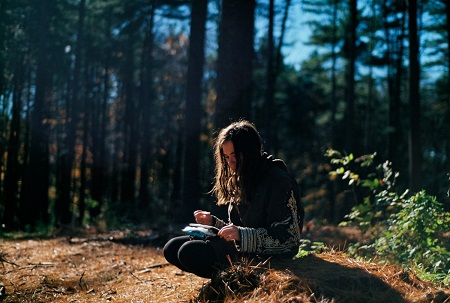
First off, apologies for not blogging last week. My Internet connection was down because another fibre company was digging in the street outside my house, and they ended up damaging my cable.
A common piece of advice given to writers is to keep a journal or diary. And to be honest, it's something I've tried a few times in my life. It never lasts more than a few days, but I think that's because:
- I've always tried to force myself to write in it every day, and I get very despondent when I miss a day, or
- When I do miss a couple of days and want to get back in it, I try to make myself record everything that's happened since my last entry, but there's no way I can fit it all in.
Eventually, I resigned myself to the fact that journaling's not for me.
But lately, I've been struggling with my writing. I've got loads of different story ideas floating around in my head, but none of them is any more than a glimmer. Little glimpes of story strands, but as soon as I try to grab onto one and plan out where it's likely to go, I got nothing.
A couple of weeks ago, I figured I'd start writing down some things in a journal. Just basic stuff, like my dreams (when I remember them), random thoughts and snippets of writing, and stuff that's happened to me and how I feel about it.
It's slow going; as of the time of this writing, I think I have maybe three entries. But I think it's already starting to bear fruit, because my thoughts are becoming a bit more coherent, and I think there might just be one complete story in there, waiting to be told.
And you know what, if I miss a couple of days between entries, I give myself permission to leave huge gaps in the "narrative"—after all, it's only ever going to be read by me. Whether it's been a day, a week, or a month since I last wrote in it, I'm going to write what I feel is important and nothing else. That's harder than you might think, for the completionist in me. But wish me luck!
Oh, and of course this isn't a physical paper book! No way, nuh-uh! I'm way too private a person for that. No, it's a Scrivener doc on my computer called "Journal"; do you really think I'm going to leave a physical book lying around where some random person might pick it up and read it? These are some of my deepest, darkest, most private thoughts, here. Sheesh.
What do you think? Whether you're a writer or not, do you keep a journal or diary? Do you think it's a good idea for a writer to do it?
Tuesday, 24 September 2019
I'm Abandoning Plain Text Emails
I've spoken about this a few times, and I think it's probably something I've been putting off for a while, but it's finally happening: from my September 2019 email newsletter, I'm abandoning Plain Text as an option.
For personal emails I send, I will still prefer Plain Text unless it's really necessary to include images or custom formatting (the emails are smaller, take less bandwidth to send, less disk space to store, and are less distracting and easier to read), but I don't think it's practical for marketing emails from a brand to specifically support plain text.
Therefore, from now on, readers who have their email clients set to display emails in Plain Text by default will receive the following text when they open my newsletter:
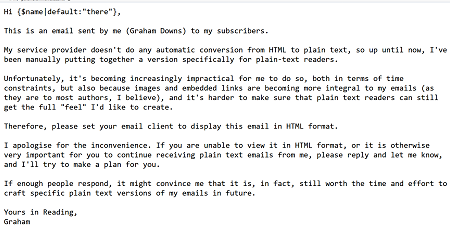
For personal emails I send, I will still prefer Plain Text unless it's really necessary to include images or custom formatting (the emails are smaller, take less bandwidth to send, less disk space to store, and are less distracting and easier to read), but I don't think it's practical for marketing emails from a brand to specifically support plain text.
Therefore, from now on, readers who have their email clients set to display emails in Plain Text by default will receive the following text when they open my newsletter:

The text of the email is as follows:
Hi {$name|default:"there"},
This is an email sent by me (Graham Downs) to my subscribers.
My service provider doesn't do any automatic conversion from HTML to plain text, so up until now, I've been manually putting together a version specifically for plain-text readers.
Unfortunately, it's becoming increasingly impractical for me to do so, both in terms of time constraints, but also because images and embedded links are becoming more integral to my emails (as they are to most authors, I believe), and it's harder to make sure that plain text readers can still get the full "feel" I'd like to create.
Therefore, please set your email client to display this email in HTML format.
I apologise for the inconvenience. If you are unable to view it in HTML format, or it is otherwise very important for you to continue receiving plain text emails from me, please reply and let me know, and I'll try to make a plan for you.
If enough people respond, it might convince me that it is, in fact, still worth the time and effort to craft specific plain text versions of my emails in future.
Yours in Reading,
Graham
What about you? Do you prefer to read emails in Plain Text? If you subscribe to my newsletters, do you think you'll ever see the above message?
This makes my heart sore, but I feel it has to be done. And now's the right time to do it.
Tuesday, 17 September 2019
Why I Wouldn't Buy a Dedicated Ereading Device
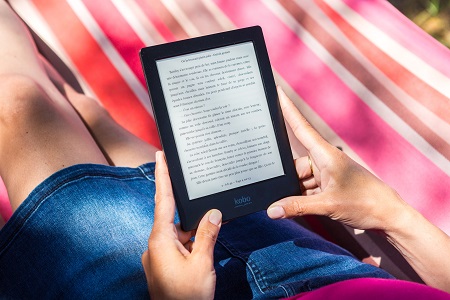
Earlier this month, ebook retailer Kobo announced a brand new, waterproof ereading device.
It looks really cool and all, but you know, it got me thinking. In this day and age, with competition in the ebook space so fierce, I don't think I would ever buy a dedicated ereading device. You don't want to be locked into any one retailer, and effectively, that's what a dedicated ereader does because you can't easily read books on it, that you bought from other stores.
I'd much rather say, go out and buy a tablet with the biggest and highest quality screen you can afford, and install all the apps. And if waterproof is really that important to you, there are rugged tablets available, specifically for that purpose (look at Rugged SA in South Africa, for example).
Sure, dedicated ereaders often have stunning screens, specifically designed to let you read in comfort for extended periods of time. Or they can be much lighter than tablets—although I personally prefer to hold something weighty anyway.
But think of the things you give up:
I want to be able to say, for any particular book, "Hey, this book's cheaper at Kobo." And buy it on Kobo and open the Kobo app on my tablet to read it.
Or for a different book, "Hey, this book's cheaper at Amazon." And buy it on Amazon and open the Kindle app on my tablet to read it.
Or for a different book, "Hey, this book's available on Scribd." And click Save For Later on Scribd and read it on my tablet at no extra charge.
And what if you have a Kobo ereader, but the book you want is only available on Amazon, or vice versa?
Sure, you could use Calibre and similar software to download the book to your PC, convert it to a format your ereader can support, and copy it over. But if the book has DRM applied (as most traditionally published books do), you'd have to strip that off first.
That's a lot of effort for most people. It's also almost certainly against the terms of service of the store you bought it from... and is possibly downright illegal if you have to strip the DRM first.
What do you think? Am I being unreasonable? Do you shop around for ebooks, or do you just buy them from your regular store without giving it a second thought?
Subscribe to:
Comments (Atom)
